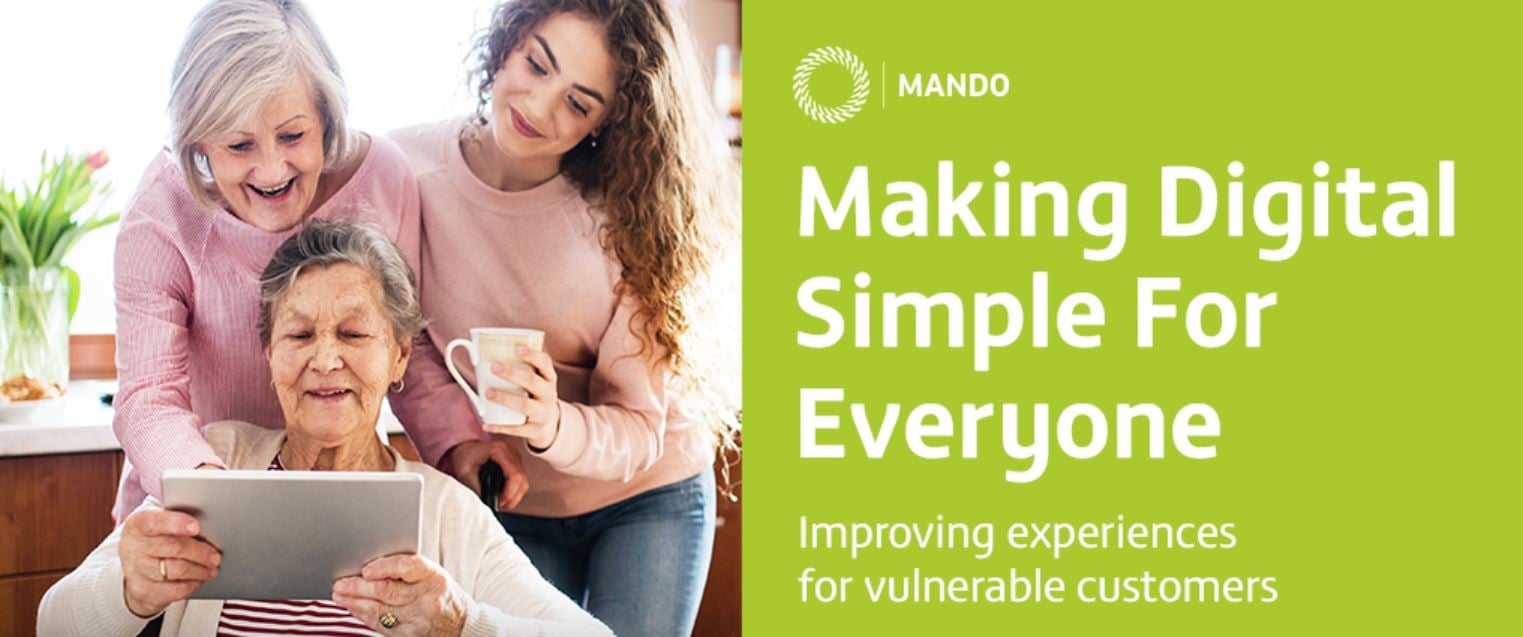Making Digital Simple For Everyone
Written by Mark Simpson

Over the past few years inclusivity has been a rising challenge for the utilities sector, one which is increasingly becoming a focus with regulators, with Ofwat and Ofgem calling for better service for all customers.
Whilst companies are shifting more and more services online and finding new ways for customers to self-serve, serving vulnerable customers with additional needs has typically been an afterthought of digital transformation, and customer experience can vary greatly.
Digital customer experience agency Mando has just released a new report Making Digital Simple For Everyone: Improving experiences for vulnerable customers. This is the culmination of interviews with charities and support groups, and roundtable events with utilities leaders.
The report explores common challenges that prevent utilities from delivering a positive experience to priority groups, hearing and sharing perspectives on how digital technology can make lives easier.
Data needs to be shared and accurate
Customer data is a common challenge across the utilities sector – ensuring its accuracy, keeping it up-to-date and incentivising customers to share this with providers. The onus has always been on the customer to register themselves as vulnerable and the size of the problem comes when you look at vastly differing numbers on priority services registers: 345,000 for water, 6 million for electricity and 4.8 million for gas. A successful pioneering data-sharing project was piloted between Electricity North West and United Utilities last year, and a sector-wide initiative is due to go live in 2020, sharing the data of customers eligible for priority services.
Personalisation can highlight support services
Personalisation is one area which has become synonymous with good customer experience. When harnessed in the right way, this can be used to better serve vulnerable customers. Digital can allow you to determine whether someone is pre-vulnerable based on their journey through a website, such as long dwell times, or confused or illogical movement – and personalised content can be tailored to their perceived needs, like making calls-to-action to feature the various support schemes offered. Care is to be taken though, personalisation can sometimes be seen as intrusive by a vulnerable person.
Everything everywhere – but integration is key
Customers are increasingly switching to digital channels and expect to be communicated to within their channel of choice. This experience, whilst improving in many areas, sometimes falls down when customers miss a payment and they drop straight into a telephone service. For a customer with additional needs, this can be difficult, particularly with multiple vulnerabilities like a hearing or speech impairment, who may struggle on the phone. The key is to consider the end-to-end journey for all customer groups, ensuring that they can begin on one channel and continue on another, whilst seamlessly integrating new and emerging channels like voice assistants and chatbots.
Prioritising accessibility
Accessibility is rarely at the forefront of digital transformation and there remains a fine balance between meeting business objectives and serving the needs of all customer groups. However, with 11 million people in the UK living with a mental or physical disability, it is something that cannot be ignored. By rethinking how we design simpler experiences that can scale to more people in new ways, they become more accessible to everyone.
AI enhances opportunities for all
AI can enhance the intelligence of both new and existing digital applications, making an impact on how utilities companies can best serve vulnerable customer groups. This is relevant, not just for the customers themselves but also for internal teams. For example, an AI-powered bot can help internal teams to surface FAQs more quickly whilst assisting a customer in the call centre, allowing the agent to more closely focus on the customer themselves. These technologies are far-reaching, including speech to text bots, language translation, and predictive analytics.
With the right approach, digital can enable companies to better serve everyone; creating efficiencies to allow frontline staff more time to spend with those in complex situations or offering up new channels that allow people to overcome their challenges.
To download and read the full report, please click here.
Register for our Utility Week webinar "Improving digital experiences for everyone" on 28th November by clicking here.
What else is going on
-
March 2024
Ghost Spam in GA4 – How to Spot and Deal With It
How to spot and deal with ghost spam in Google Analytics 4 (GA4) to safeguard your data insights. Implement proactive measures to maintain data accuracy.
-
November 2023
Mando to bridge skills gap at BIMA Digital Day
The BIMA Digital Day on November 8th is an attempt to bridge this skills gap, as eight of Mando's experts will spend time with around 240 Year 10 students from The Studio School at their Liverpool campus.
